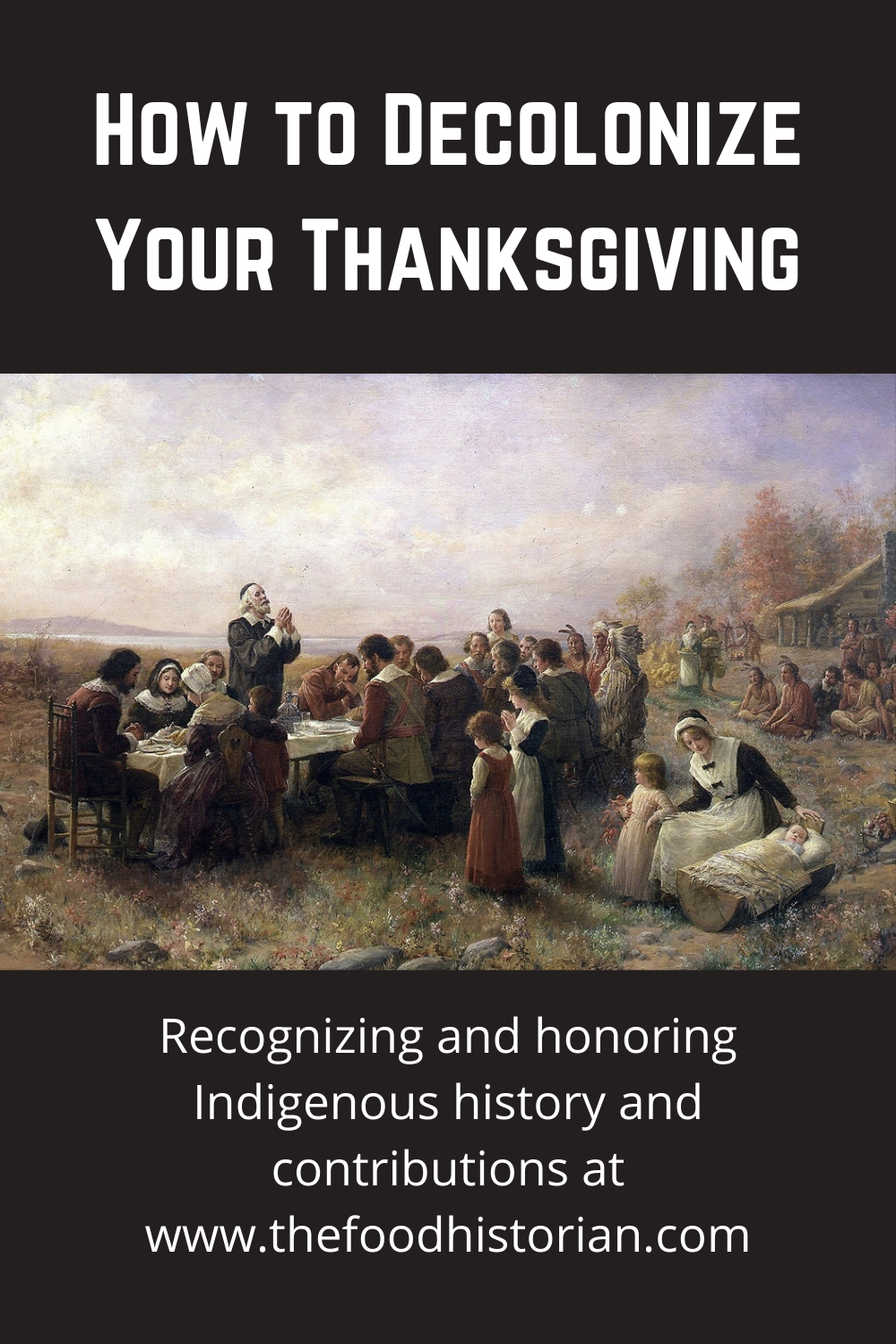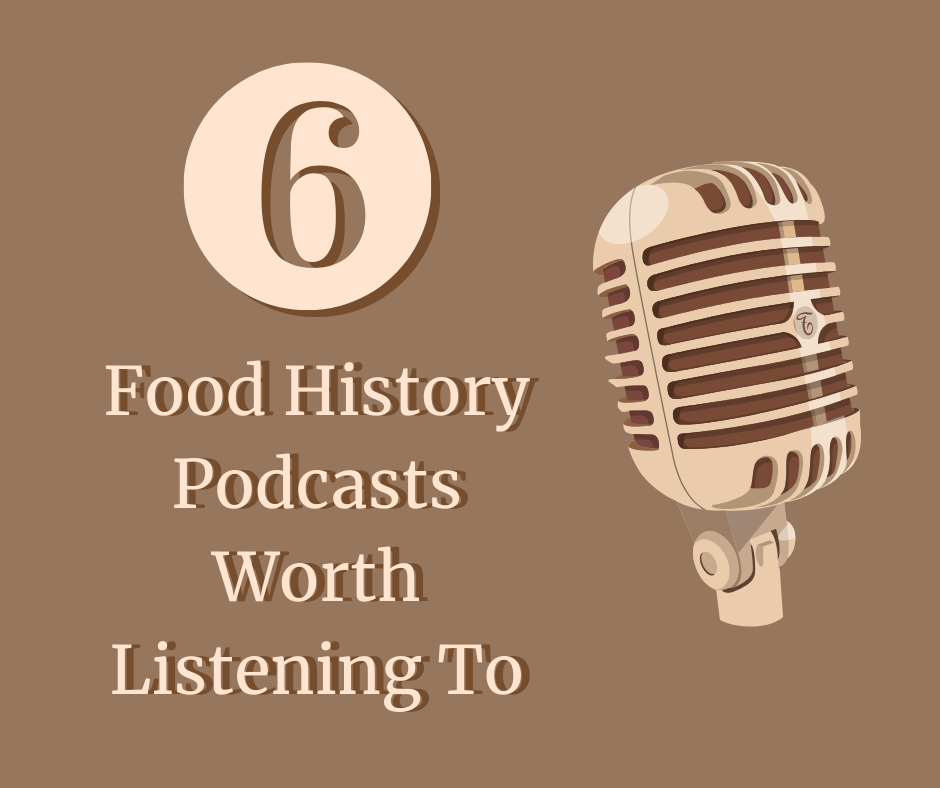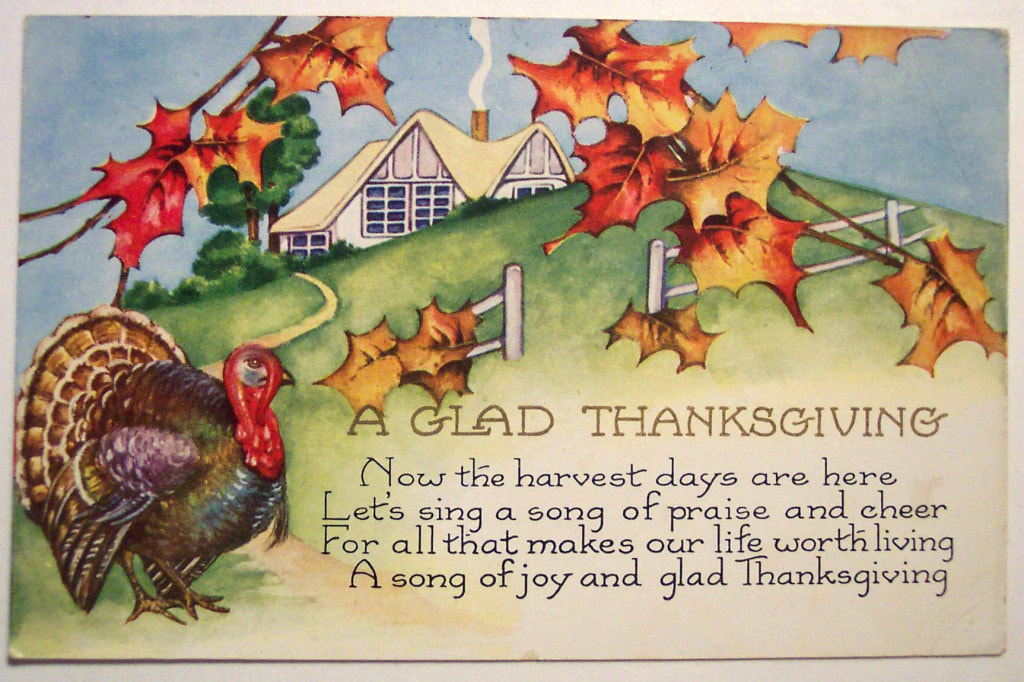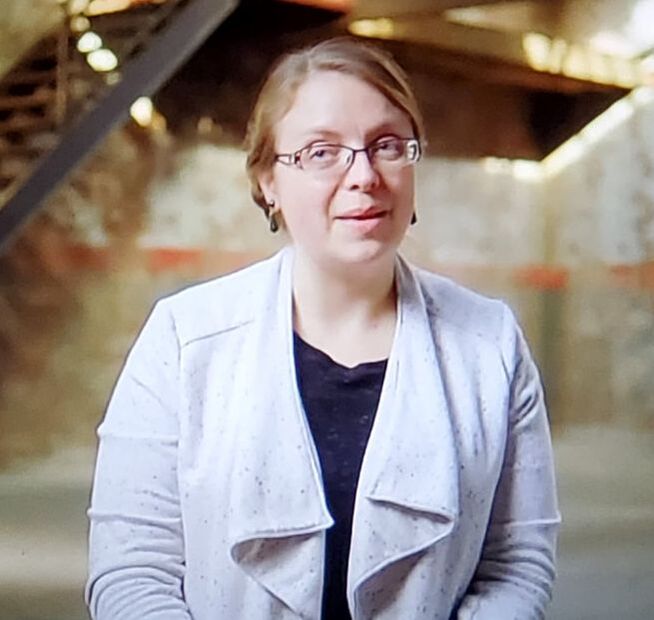|
Think about the story of Thanksgiving you grew up with - Pilgrims in black clothes and funny hats and white aprons and shoes with big buckles sitting down to a Thanksgiving dinner with "the Indians," celebrating peace and harmony and the harvest. Maybe you made a construction paper turkey by tracing your hand. Maybe your teacher made Pilgrim hats and bonnets and "Indian headdresses." The focus was on the food and American exceptionalism. The real story is much, much different. "The First Thanksgiving," in 1621 was preceded and followed by violence. Indigenous voices and the role of the Wampanoag people in literally saving the lives of the English separatists (they didn't call themselves "Pilgrims") have been purposefully erased. The legacy of Indigenous foods - cultivated and created by Indigenous people - has also been largely erased from our cultural lexicon. So what can we do about it? This year, you can decolonize your Thanksgiving by learning the real history behind it and familiarizing yourself with the various Indigenous nations in your own backyard and who played an important role in American history. Today's blog post is essentially going to be a giant collection of articles to read and films to watch. I hope you take the time this weekend to read or watch a few with your family or friends and discuss (especially with your kids) the real story behind the myth. Mythbusting the First Thanksgiving What Really Happened at the 1st Thanksgiving from Voice of America What you learned about the ‘first Thanksgiving’ isn’t true. Here’s the real story - from USA Today via the Cape Cod Times The Real History Of The First Thanksgiving That You Didn’t Learn In School from All That Interesting Everything You Learned About Thanksgiving Is Wrong from the New York Times The Real History Of Thanksgiving Isn't The One You Learned In School—Here's How To Celebrate Smarter from Delish The Myths of the Thanksgiving Story and the Lasting Damage They Imbue from Smithsonian Magazine The true story behind Thanksgiving is a bloody one, and some people say it's time to cancel the holiday from Insider The Thanksgiving Myth Gets a Deeper Look This Year from the New York Times Meet the WampanoagMashpee Wampanoag Tribe The Mashpee Wampanoag Tribe, also known as the People of the First Light, has inhabited present day Massachusetts and Eastern Rhode Island for more than 12,000 years. After an arduous process lasting more than three decades, the Mashpee Wampanoag were re-acknowledged as a federally recognized tribe in 2007. In 2015, the federal government declared 150 acres of land in Mashpee and 170 acres of land in Taunton as the Tribe’s initial reservation, on which the Tribe can exercise its full tribal sovereignty rights. The Mashpee tribe currently has approximately 2,600 enrolled citizens. Learn more >>> Wampanoag History from the Wampanoag Nation 400 Years After the ‘First Thanksgiving,’ the Tribe That Fed the Pilgrims Continues to Fight for Its Land Amid Another Epidemic from Time Magazine In 1621, the Wampanoag Tribe Had Its Own Agenda from The Atlantic “OUR” STORY: 400 Years of Wampanoag History an online exhibit with short documentary films from Plymouth 400. U.S. Appeals Ruling In Mashpee Wampanoag Land Case from WBUR and the Cape Cod Times. Although the Mashpee Wampanoag won their case against the Department of the Interior, which had revoked their federal recognition, the US government is currently appealing that ruling. Hopefully that appeal process will cease in 2021. National Day of MourningThe National Day of Mourning was organized in 1970 in response to a specific event of the suppression of history. This is the 50th anniversary of that event. Here's some background on what led to the creation of the National Day of Mourning from the United American Indians of New England: "In 1970, United American Indians of New England declared US Thanksgiving Day a National Day of Mourning. This came about as a result of the suppression of the truth. Wamsutta, an Aquinnah Wampanoag man, had been asked to speak at a fancy Commonwealth of Massachusetts banquet celebrating the 350th anniversary of the landing of the Pilgrims. He agreed. The organizers of the dinner, using as a pretext the need to prepare a press release, asked for a copy of the speech he planned to deliver. He agreed. Within days Wamsutta was told by a representative of the Department of Commerce and Development that he would not be allowed to give the speech. The reason given was due to the fact that, "...the theme of the anniversary celebration is brotherhood and anything inflammatory would have been out of place." What they were really saying was that in this society, the truth is out of place. "What was it about the speech that got those officials so upset? Wamsutta used as a basis for his remarks one of their own history books - a Pilgrim's account of their first year on Indian land. The book tells of the opening of my ancestor's graves, taking our wheat and bean supplies, and of the selling of my ancestors as slaves for 220 shillings each. Wamsutta was going to tell the truth, but the truth was out of place. "Here is the truth: "The reason they talk about the pilgrims and not an earlier English-speaking colony, Jamestown, is that in Jamestown the circumstances were way too ugly to hold up as an effective national myth. For example, the white settlers in Jamestown turned to cannibalism to survive. Not a very nice story to tell the kids in school. The pilgrims did not find an empty land any more than Columbus "discovered" anything. Every inch of this land is Indian land. The pilgrims (who did not even call themselves pilgrims) did not come here seeking religious freedom; they already had that in Holland. They came here as part of a commercial venture. They introduced sexism, racism, anti-lesbian and gay bigotry, jails, and the class system to these shores. One of the very first things they did when they arrived on Cape Cod -- before they even made it to Plymouth -- was to rob Wampanoag graves at Corn Hill and steal as much of the Indians' winter provisions as they were able to carry. They were no better than any other group of Europeans when it came to their treatment of the Indigenous peoples here. And no, they did not even land at that sacred shrine down the hill called Plymouth Rock, a monument to racism and oppression which we are proud to say we buried in 1995. "The first official "Day of Thanksgiving" was proclaimed in 1637 by Governor Winthrop. He did so to celebrate the safe return of men from Massachusetts who had gone to Mystic, Connecticut to participate in the massacre of over 700 Pequot women, children, and men. "About the only true thing in the whole mythology is that these pitiful European strangers would not have survived their first several years in "New England" were it not for the aid of Wampanoag people. What Native people got in return for this help was genocide, theft of our lands, and never-ending repression. "But back in 1970, the organizers of the fancy state dinner told Wamsutta he could not speak that truth. They would let him speak only if he agreed to deliver a speech that they would provide. Wamsutta refused to have words put into his mouth. Instead of speaking at the dinner, he and many hundreds of other Native people and our supporters from throughout the Americas gathered in Plymouth and observed the first National Day of Mourning. United American Indians of New England have returned to Plymouth every year since to demonstrate against the Pilgrim mythology. "On that first Day of Mourning back in 1970, Plymouth Rock was buried not once, but twice. The Mayflower was boarded and the Union Jack was torn from the mast and replaced with the flag that had flown over liberated Alcatraz Island. The roots of National Day of Mourning have always been firmly embedded in the soil of militant protest." You can learn more about the United American Indians of New England and their mission and watch a livestream of their National Day of Mourning program live from Plymouth here: http://www.uaine.org/ Not all Native Americans celebrate Thanksgiving. Find out why. from the Cape Cod Times. For Native Peoples, Thanksgiving Isn't A Celebration. It's A National Day Of Mourning from WBUR 400 Years After First Thanksgiving, Native Americans Honor 'Day of Mourning' Instead from Newsweek Indigenous Foods & Thanksgiving DinnerYou may recall my catalog of Indigenous foods a few weeks ago. The global impact of Indigenous agriculturalists is a staggering and often overlooked or ignored part of our history. Here are some books, films, and articles you can read to learn more about the impact of Indigenous food on our diet and the struggles of Indigenous chefs and historians to reclaim their food sovereignty. Indigenous Chefs On Traditional Cooking And Their Complicated Relationship With Thanksgiving from Delish Native Americans want to decolonize Thanksgiving with native foods and a proper history lesson KIRO radio Sean Sherman, The Sioux Chef: ‘This Is The Year To Rethink Thanksgiving’ from the Huffington Post This Thanksgiving, Make These Native Recipes From Indigenous Chefs from the Huffington Post 3 Indigenous Chefs Talk About What Thanksgiving Means to Them from Bon Appetit This Thanksgiving, try these recipes for local Native American foods from Kansas City Magazine How to Decolonize Your Thanksgiving Dinner by Vice “We are still alive”: How Native communities grapple with Thanksgiving’s colonial legacy from The Counter Films to Watch this ThanksgivingI cannot recommend the film Gather enough. You can rent it on Vimeo, Amazon Prime, or check their website for free screenings. It's stunningly filmed, it portrays a huge variety of Indigenous voices and stories, and it tells an amazing story of the effort of Indigenous people to reclaim their food sovereignty. Sean Sherman, also known as the Sioux Chef, has done a lot to bring national attention to Indigenous foodways. He's written a book and you can learn more about him on his website. Andi Murphy is the host of the Toasted Sister Podcast: Radio about Native American Food. Well folks if I want to get this done before midnight on Thanksgiving I have to stop, but stay tuned for another post on Indigenous Food Historians You Should Know, which I hope to get up soon. Featuring all kinds of amazing people, stories, books, and even more documentary films. I hope this collection of resources has helped you re-learn your American history and decolonize your Thanksgiving this and every year. As always, The Food Historian blog is supported by patrons on Patreon! Join us for awesome members-only content like free digitized cookbooks from my personal collection, e-newsletter, and even snail mail from time to time!
1 Comment
Like many of you, I'm 100% at home right now. Working from home, writing from home, eating at home, and generally not leaving the house except for a weekly grocery run! To alleviate boredom, sometimes it's fun to listen to podcasts while doing things like laundry, working out, the dishes, or any other task that occupies your hands but not your brain. There are a number of newer food history podcasts out there, so I wanted to share some just in case you weren't familiar. 1. A Taste of the Past Linda Pelacchio has been hosting "A Taste of the Past" over at Heritage Radio Network since 2009. She interviews chefs, food writers, and food historians. And with over 300 episodes to choose from, she'll keep you entertained for a long time. 2. Gastropod Gastropod is another of the more established food history podcasts out there, and hosts Cynthia Graber and Nicola Twiley have great rapport as they look at some of the fun (and usually relevant) food histories out there. New episodes every two weeks. 3. The Feast The Feast is hosted by medievalist and academic food historian Laura Carlson. Started in 2016, there's lots to love here, so dig in! 4. The Fantastic History of Food Hosted by cookbook author Nick Charley Key, this brand new podcast (started in 2019) already looks like a fun one. 5. Victory Kitchen Podcast My new Instagram friend, author Sarah Creviston Lee (another Sarah!) has started a Victory Kitchen Podcast, which is quite good. In it, she focuses on food and rationing during World War II. Only five episodes so far, but all fascinating and her supplemental blog posts are excellent. 6. Florida Oranges: A Colorful History Erin Thursby, author of the book, "Florida Oranges: A Colorful History," has a podcast based on her book! Launched last year it's a deep dive into the history of Florida's orange growing industry. Not as polished as some of the other podcasts, but still worth a listen. What do you think? Did I miss any? And of course, if you get really bored, you can listen to old episodes of History Bites. I promise as soon as the book is done, I'll get back to podcasting! If you liked this post, please consider becoming a member or joining us on Patreon. Members and patrons get special perks like access to members-only content.
Happy Thanksgiving, Everyone!I've been a bit remiss in post-sharing on Facebook these days, but now that the turkey and all the fixin's (except the pie!) have been consumed at my mother-in-law's house, it's time for a roundup of all the great Thanksgiving-related articles across the web you may have missed these past few weeks. (This is a regular perk of being a Patreon patron, by the way.) Let's start with "Why We Celebrate Thanksgiving On the Fourth Thursday of November" from NPR. Indigenous Histories of Thanksgiving"The Thanksgiving Tale We Tell is a Harmful Lie. As a Native American, I've Found A Better Way to Celebrate the Holiday" Sean Sherman for Time Magazine. "3 Indigenous Chefs Talk About What Thanksgiving Means to Them" from Bon Appetit. "Modern Native American Cuisine and the Myth of Thanksgiving" from Modern Farmer. "The Native American Side of the Thanksgiving Menu" from NPR. "The Real Thanksgiving Foods" from Powwows.com. Early American Thanksgivings"Thanksgiving History: The Original Farm to Table Experience" from WVTF public radio. "400 Thanksgiving Turkeys Walking to Washington (D.C.) Market in 1826" from Researching Food History. "Thanksgiving at Washington Market, New York City" also from Researching Food History. "George Washington and Thanksgiving" from Mount Vernon. "Colonial Thanksgiving Recipes To Celebrate American History" from Walter Staib on PBS. The African-American Experience"Chef Marcus Samuelsson Gives Thanks: On Harlem, the black diaspora, and his own journey" on Salon. "The Roots of Black Thanksgiving: Why Macaroni and Cheese and Potato Salad Are So Popular" from the Washington Post. "Thanksgiving Soul Food Offers a Window to African-American Heritage" from the Baltimore Sun. Ingredients & Dishes"The History Behind 10 Thanksgiving Dishes" from Mentalfloss. "The History of Popular Thanksgiving Foods" from Redbook. "Hey! What Are These Oysters Doing In My Stuffing?" from Food52. "The Real Reason Sugar Has No Place in Cornbread" from Serious Eats. "Cornbread Dressing Is So Much More Than a Thanksgiving Side" from The Takeout. "Cornbread Kush Stuffing" from Michael Twitty via Vice. "From Culinary Dud to Stud: How Dutch Plant Breeders Built Our Brussels Sprouts Boom" from NPR. "This Twitter Thread On Weird Thanksgiving Side Dishes Does Not Disappoint" from the Huffington Post. "Filling the Cornucopia" from the American Folklife Center, Library of Congress. "Why President Calvin Coolidge Never Ate His Thanksgiving Raccoon" from Atlas Obscura. And, find out what happened to Rebecca in "The Thanksgiving Raccoon That Became a Presidential Pet" from History.com "This Man Made the First Canned Cranberry Sauce" from Smithsonian. "The Case for Heritage Turkeys" from Modern Farmer. Desserts"The Great Thanksgiving Dessert Battle" from the Philadelphia Sun. "A Brief History of Pumpkin Pie in America" from the Library of Congress. "American History As Told By 7 Pies" from Matador Network. "A Brief History of Pecan Pie" from Eater. Vegetarians"The Turkey Has Been the Subject of Thanksgiving-Day Arguments for Longer Than You Probably Think" from Time Magazine. "Turkey Alternatives Aren't the Key to Enjoying a Meatless Thanksgiving" from Diamondback. "Vegetarian Thanksgiving Dates Back to the 1900s" from JSTOR. Phew! That's it for the Thanksgiving Roundup this year. I hope this provides some good, post-feast reading and a way to work off that food coma before you feast on some pie. :D
If you want more roundups of food history-related news, consider becoming a member of The Food Historian! Regular roundups are a perk for every member level. You can join online here, or you can join us on Patreon! Members get access to members-only sections of this website, special updates, plus discounts on future events and classes. And you'll help support free content like this for everyone. Join today! |
AuthorSarah Wassberg Johnson has an MA in Public History from the University at Albany and studies early 20th century food history. Archives
July 2024
Categories
All
|




 RSS Feed
RSS Feed